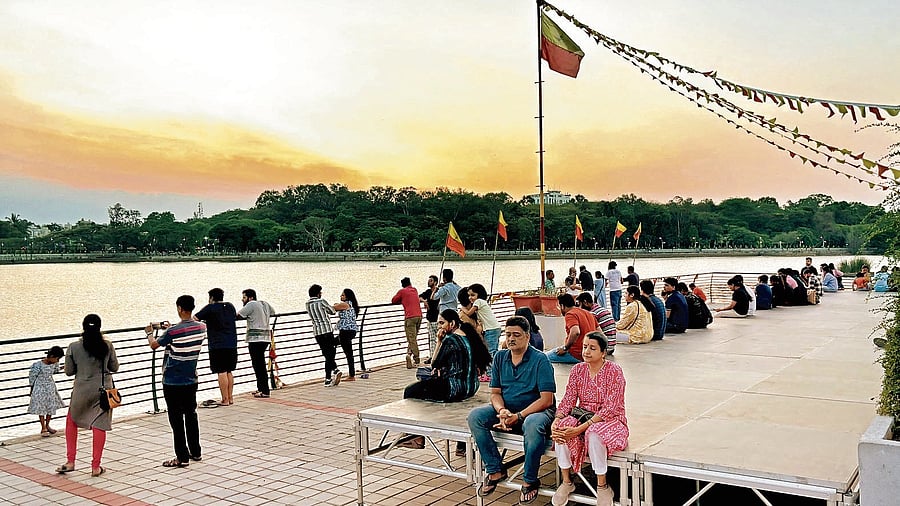
Preparations underway for BWSSB's 'Cauvery Aarathi' on the lines of 'Ganga Aarti' at Sankey Tank in Bengaluru.
Credit: DH Phot/ Pushkar V
Bengaluru: The plan to organise the ‘Cauvery Aarti’ at Sankey Tank on Friday evening, expected to draw 10,000 people, has sparked criticism from some members of the public.
They argue that the event does not fall within the mandate of the Bengaluru Water Supply and Sewerage Board (BWSSB).
Some residents have also raised concerns that the religious ceremony, which involves lights and music, could threaten the lake’s fragile ecology. They have suggested relocating the event to a different venue.
However, others hold a different view, pointing out that the city has a tradition of offering prayers such as ‘Bagina', 'Kodi Habba', and 'Ganga Aarti' to lakes and waterbodies as a mark of respect and gratitude.
The mixed response to the BWSSB’s Cauvery Aarti follows a DH article titled “In a first, Bengaluru to host 'Cauvery Aarti' at Sankey Tank”.
As part of the ceremony, the BWSSB plans to fly in priests from Varanasi, hold a procession from the Shri Gangamma Jala Thayi temple, and conduct a puja in the presence of top government officials.
“Sankey Tank is already struggling with sewage contamination. The BWSSB should prioritise addressing such issues,” said Kimsuka Iyer, a member of Citizens for Sankey. She added, “Allowing an event of this scale — with 10,000 people, loud sounds, structural setups, and increased waste — will severely disrupt the lake’s ecosystem, which is home to the endangered slender loris and migratory birds.”
Preeti Sunderajan, a resident of Malleswaram, voiced similar concerns, stating that the event disregards the ecological impact of mass gatherings in the name of religious activities. “With no local governing body and no right to protest, residents seem to have no way to voice their concerns,” she said.
Vinay Kumar, an aerospace engineer who was born and raised near Sankey Tank, called the event a “perfect recipe to kill a lake”.
'Forgotten traditions'
However, V Ramprasad, convener of Friends of Lakes, disagreed, arguing that Ganga Aarti is part of Bengaluru’s forgotten traditions.
“As long as the event is not for commercial purposes, there is nothing wrong with holding a religious programme that does not contaminate the water or create noise pollution,” he said. He did, however, suggest that the BWSSB drop the live music from the programme.
Citing Section 12 of the Karnataka Tank Conservation and Development Act, senior advocate GR Mohan argued that the event violates the law. “A mass gathering is detrimental to the lake. Holding a religious event within the lake premises is strictly prohibited. The government must relocate it elsewhere,” he said.
